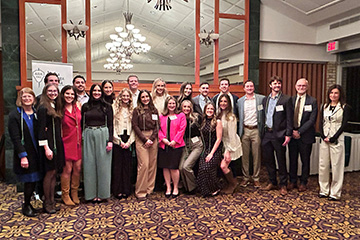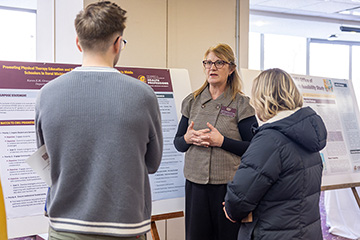CMU College of Medicine works to break the ACEs cycle
The data on the impact of childhood trauma on someone’s health is clear to Bradley Hunt, a Central Michigan University College of Medicine student preparing to present research at a childhood trauma conference hosted by the college.
“Heart disease, strokes…substance abuse is a big one,” Hunt said. “Those can all be predicted to some degree based on the number of ACEs a child has experienced.”
The college is a partner in the Michigan Ace Initiative, which aims to raise awareness about Adverse Childhood Experiences, prevent and reduce them and foster trauma-informed healing. In addition, it addresses the problem through participation in a community-oriented training program.
ACEs is an umbrella term to describe highly stressful or traumatic childhood experiences, including abuse, neglect or exposure to parental substance abuse. These experiences fall into three categories: abuse, neglect and household dysfunction, such as a parent engaging in substance abuse.
Children who experience ACEs may have increased risks for physical and behavioral health challenges that can last well into adulthood. More frequent or serious trauma can lead to more severe physical health impacts. According to 2019 data, 68 percent of Michigan adults responding to a survey reported having one or more ACEs.
It’s also a multi-generational problem. ACEs alter the way the brain and body develop. During critical periods of growth, high exposure to ACEs can disrupt and change the way genes are supposed to function, and this can cause ACEs and risks for poor health outcomes to be passed along from parents to their children.
“Prevention can help in so many spheres,” said Dr. Kai Anderson, a psychiatrist and faculty member with the college. The effects of ACEs can reduced and prevented by positive childhood experiences that include safe, stable and nurturing adult relationships. Reducing ACEs and stopping intergenerational trauma was a key goal in the Michigan Statewide ACEs State Action Plan.
CMU was one of seven partners in developing the plan, which was released in July 2020. One of the plan’s objectives is to adopt prevention strategies and protect Michigan residents most vulnerable to ACEs.
Michigan ACE Initiative conference
The plan’s future was the focus of a May 24 conference hosted by CMU. Initiative partners from across Michigan gathered in McGuirk Arena to share stories about local successes.
They also shaped the initiative’s future in an afternoon work group session.
“CMU’s role as catalyst was clear in hosting this summit, which will lead to a statewide ACEs prevention plan,” said Alison Arnold, director of the College’s Interdisciplinary Center for Community Health and Wellness. “That role will continue in the ways CMU is educating students, training physicians and teachers to provide well-needed care, and preparing future citizens to building thriving communities and better lives for all people in Michigan and beyond.”
The conference included informational poster presentations in the gallery outside the arena. One of them was Hunt, who was part of a group of medical school researchers who looked into whether ACEs increased during the COVID-19 pandemic.
They drew inspiration from similar research in Germany, which determined that ACEs did increase in that country. Hunt said they looked for research that was specific to the United States. When they couldn’t find any, they decided to do their own.
Six students undertook the research for what started as a class project. It expanded into something bigger. They hope to eventually publish what they learned.
ACE master trainers
One component is the master trainer program. Master trainers equip other organizations with tools to recognize and prevent ACEs.
The college started its master trainer program in 2016, Arnold said. There are more than a dozen master trainers across the university, including Anderson, Arnold and Cheryl Geisthardt. Geisthardt presented at the May 24 conference.
Some of the training takes place right in the college, said Anderson, who is a master trainer.
There’s also outreach to other organizations, including local schools and criminal justice institutions. In 2020, the college published a six-part podcast series called Responding to ACEs.
It’s important to prevent retraumatizing people with restraints and seclusion policies, if possible, she said. Creating trauma-informed environments is crucial for recovery.




